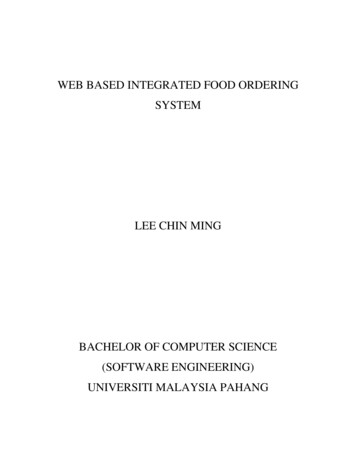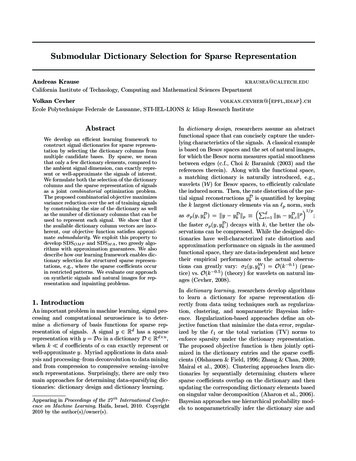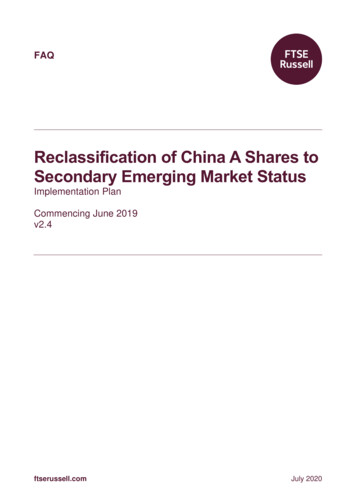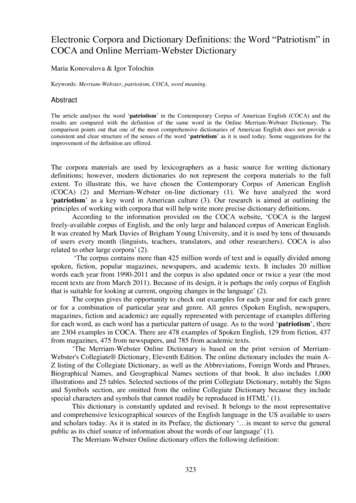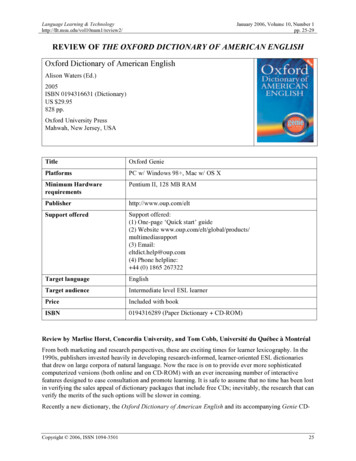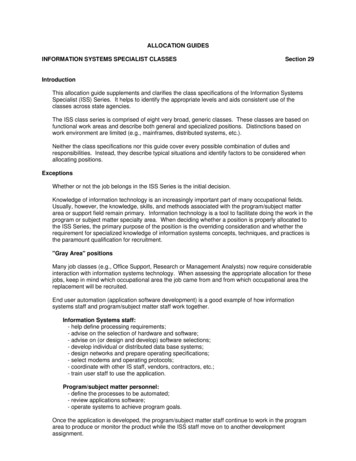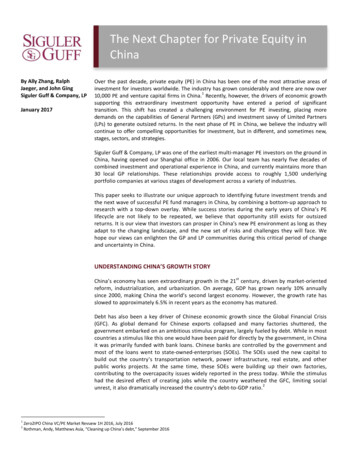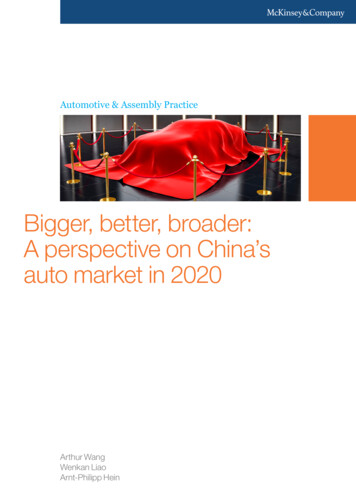
Transcription
THEDECODINGCHINADICTIONARYEDITED BY MALIN OUD AND KATJA DRINHAUSEN
The Decoding China DictionaryEdited by Malin Oud and Katja DrinhausenWith contributions by David Bandurski, Katja Drinhausen, Jerker Hellström,Malin Oud and Marina RudyakDesign concept and typesetting by Tommaso FacchinIllustrations by Anna FormilanLayout by Eve RogersContactMalin Oudmalin.oud@decodingchina.euCopyright 2021 belong to the individual authors as indicated under the respectivechapters. The views expressed in this publication are the sole responsibility of theauthors and do not reflect any institutional positions.
TABLE OF CONTENTSINTERPRETING CHINA IN INTERNATIONAL COOPERATION AND DIPLOMACY1CIVIL SOCIETY (公民社会)7COOPERATION (合作)11CULTURE (文化)14DEMOCRACY (民主)18DEVELOPMENT (发展)22FREEDOM OF SPEECH / FREEDOM OF EXPRESSION (言论自由)26GOOD GOVERNANCE (良政善治)30HUMAN RIGHTS (人权)34MULTILATERALISM (多边主义)38PEACE (和平)42PUBLIC DIPLOMACY (公共外交)46RULE OF LAW (法治)50SECURITY (安全)53SOVEREIGNTY (主权,国权)57AUTHOR BIOGRAPHIES60RESOURCES AND RECOMMENDED FURTHER READINGS62
INTERPRETING CHINA IN INTERNATIONALCOOPERATION AND DIPLOMACYChina’s new position as a majorglobal power is having a profoundimpact on international relations andglobal governance. China has longabandoned its previous foreign policy of“keeping a low profile and biding one’stime”, instead becoming an activeinternational actor and normentrepreneur. European public and civilsociety actors encounter China at everyturn. The country has become a majorplayer in the global development spherethrough both aid and developmentfocused investment.1 All majorinternational NGOs are active incountries that are part of China’s Beltand Road Initiative. The People’sRepublic of China (PRC) is also anincreasingly important security actor.world’s second largest economy, thecountry has shown no inclinations toembark on political reform but remainsan authoritarian one-party state.China's growing economic andpolitical power has spurred a debate inthe West about how best to engage withthe country on a range of issues, fromhuman rights to climate cooperation,science innovation and nuclear nonproliferation. The European Union seesChina as a necessary partner inaddressing global challenges such asclimate change, global health andreducing global inequalities, but alsoviews it as a “strategic competitor” and a“systemic rival”.2 A central conundrumfor policy-makers in liberal democraciesis that, while four decades of “reformand opening up” has transformed Chinafrom an impoverished nation into theThat expertise is needed more thanever. Chinese ideas are increasinglymaking their way into UN documents,where international norms andprinciples such as the rule of law,human rights and democracy areimbued with new meaning and “Chinesecharacteristics”. Chinese diplomatsoften lament that the Westmisunderstands China. President andGeneral Secretary of the ChineseCommunist Party (CCP) Xi Jinping hasrepeatedly stressed the importance of“telling China’s story well” and boostingits voice in order to “create a favourableclimate of international public opinion”.413 TheA., Dreher, A., Fuchs, B., Parks, A., M. Strange, M.,J. Tierney, ‘Aid, China, and Growth: Evidence from aNew Global Development Finance Dataset’, Aiddata,2017, ce-dataset2 European Commission, High Representative of TheUnion for Foreign Affairs and Security Policy, ‘EUChina – A strategic outlook’, Publications Office of theEuropean Union, mentplan/34728/eu-china-relations-factsheet enTHE DECODING CHINA DICTIONARYUnfortunately, Europe’s recognitionof China’s rise to global-power statushas not been matched by muchinvestment in knowledge about thecountry. An article by The Economistfrom November 2020 queried whetherdemocracies can compete with Chinawithout understanding it and warned ofa “gradual hollowing out” of expertise onthe country.3 The numbers of studentstaking Chinese languages or areastudies at universities are falling, andEuropean diplomats and policy-makerswho are proficient in Chinese are asrare today as they were thirty years ago.Economist, ‘As China’s power waxes, theWest’s study of it is waning’, The Economist, 26November 4 People’s Daily, ��会议重要讲话精神’ [‘Continuously improving the influence ofChinese culture: Studying and implementing the spiritof General Secretary Xi Jinping's important speech atthe National Propaganda and Ideological Work1
The Chinese government spendssignificant efforts both internationallyand domestically on promoting a“correct understanding” of China, i.e.one aligned with the Chinese PartyState's priorities.The Chinese leadership strives topresent the PRC as a benevolent andresponsible international power, achampion of fair multilateralism and aleader of the developing world.5 China’sdiscourse of peace, development anddemocracy is framed around the notionof a global anti-imperialist and anticolonialist struggle, which positionsChina as a developing country in theGlobal South that is challenging thehegemony of the Global North. Thisdebate is not new at the UN, wheremember states have been divided alongdifferent ideological north, south, eastand west lines since its founding in1945. When human rights concerns areraised, China accuses its critics of“politicization” and of having an“imperialist” or “Cold War mentality”.Instead it calls for democracy at the UN,respect for China’s right todevelopment, and mutually beneficialcooperation over “shared interests”.A notable difference can bediscerned in the messaging for domesticaudiences compared to what occurs onthe international stage. For example, inhis recent statements at the UN GeneralAssembly in 2020 and at the WorldEconomic Forum in 2021, Xi Jinpingcalled for the world to “join hands touphold the values of peace,development, equity, justice, /n1/2018/0902/c4053130266428.html5 Xinhua News Agency, ‘China remains a responsiblepower around the world, says Chinese FM’, XinhuaNews Agency, 23 October 2019,http://www.xinhuanet.com/english/201910/23/c 138497103.htm6 See for example the Ministry of Foreign Affairs ofthe People's Republic of China, ‘Xi Jinping Deliversan Important Speech at the General Debate of theTHE DECODING CHINA DICTIONARYand freedom shared by all of us andbuild a new type of internationalrelations and a community with a sharedfuture for mankind.”6 By contrast, in anarticle in the Party’s leading theoreticaljournal Qiushi in 2019, Xi Jinping statedthat China “must never follow the pathof Western ‘constitutionalism,’‘separation of powers,’ or ‘judicialindependence”. Instead, Xi said, Chinashould follow its own path and “be adeptat using law when participating ininternational affairs. In the struggleagainst foreign powers, we must takelegal weapons, occupy the high groundof the rule of law [ ]. We must activelyparticipate in the formulation ofinternational rules and act asparticipant, promoter, and leader duringthe changing process of globalgovernance.”7A similar ambiguity of treatmentbecomes apparent in a deeper readingof Chinese official sources. Whileostensibly invoking the same conceptsof freedom, democracy, rule of law andhuman rights, there are fundamentaldifferences in the definitions andunderlying political priorities and socialvalues of these concepts in liberaldemocracies compared to China. Whilethere is common ground with regard tostrengthening legal predictability,effective governance and sustainability,the Chinese leadership prioritizes PartyState stability as a collective interest,legitimizing even repressive measures.For example, the crackdowns inXinjiang and Hong Kong are routinely75th Session of the United Nations (UN) GeneralAssembly’, Ministry of Foreign Affairs of the People'sRepublic of China, 22 September, 2020,https://www.fmprc.gov.cn/mfa eng/zxxx 662805/t1817766.shtmlXi Jinping, trengthen the Party’s leadership overcomprehensive rule by law’], Qiushi, April 2019,http://www.qstheory.cn/dukan/qs/201902/15/c 1124114454.htm72
framed in terms of human rightsprotection and good governance.8This conceptual framing is nocoincidence, but the outcome ofcoordinated initiatives by the Chineseleadership to develop China’s owndiscursive system and to build itsdiscursive power.9 Domestically, theChinese government has always paidclose attention to propaganda and howto “do things with words”.10 The influx ofWestern liberal values in the 1980s,such as democracy and human rights,were seen as a root cause of theprotests of 1989 and a threat to thesurvival of the CCP. China’s paramountleader Deng Xiaoping stated in aspeech in 1989 that he consideredinsufficient ideological and politicaleducation to be the biggest reformfailure of the 1980s.11 But the long-termapproach taken by the Party-State wasnot the blanket repression of terms, butrather integrating them into the CCP’sideological canon and redefining them ina way that makes them harmless to itsclaim on power.Many of the concepts discussed inthis “Decoding China Dictionary” projectfiltered into the Chinese official CCPlanguage in the decades of “reform andopening” that commenced in 1979, wereaccelerated after Deng Xiaoping’sSouthern Tour in 1992, and laid the8See for example:‘The Fight Against Terrorism and Extremism andHuman Rights Protection in Xinjiang’, itepaper/node8011005.htmXinhua News Agency, ‘National security law to boostgood governance in Hong Kong: experts’, XinhuaNews Agency, 9 July 2020,http://www.xinhuanet.com/english/202007/09/c 139200480.htm9 M., Ohlberg, ‘Boosting The Party’s Voice, China’squest for global ideological dominance’, MERICSMercator Institute for China Studies, /China Monitor 34 Ideological dominance EN.pdf10 M., Schoenhals, Doing Things with Words inChinese Politics: Five Studies, Center for ChineseStudies, Institute of East Asian Studies, University ofCalifornia, 1992THE DECODING CHINA DICTIONARYground for China’s accession to theWTO in 2001. When Hong Kong wasreturned to China in 1997, it was hopedthat a further convergence of values andsystems would occur. And indeed, theterm human rights was introduced in theChinese Constitution in 2004, hailed asa new era of constitutional rightsprotection.12 Democracy, freedom andthe rule of law are now part of the canonof core socialist values being promotedunder Xi Jinping.At the same time, these conceptshave undergone a major revamp tomake them compatible with the CCP’spolitical and ideological system. UnderXi, measures to define and safeguard aChinese value system not reliant onliberal ideas have intensified. DocumentNo. 9, issued by the party leadership in2013, was a mission statement to guardagainst constitutional democracy,universal values and civil society in theirliberal sense.13 The concern that liberalor “Western” values are a threat toChina’s unity and political stability isequally reflected in a set of securityrelated laws and regulations introducedin the last decade, most recently theHong Kong National Security Law.14Meanwhile, China’s economicsuccess and role as a motor of globalgrowth in the aftermath of the 2008financial crisis and, most recently, the11Zhen Wang, Never Forget National Humiliation:Historical Memory in Chinese Politics and ForeignRelations, 2012, Columbia University Press, p.9612 State Council Information Office, ‘Progress inHuman Rights over the 40 Years of Reform andOpening Up in China’, 13 December ent/1643472/1643472.htmChinaFile, ‘Document 9: A ChinaFile Translation,How Much Is a Hardline Party Directive ShapingChina’s Current Political Climate?’, ChinaFile, 8November etranslation14 Global Times, ‘US 'black hands' behind HKeducation shows need for national security law’, 17April tml133
Covid-19 pandemic has boostedconfidence in China and its governancesystem as an alternative and superiormodel. As Xi Jinping has called for onnumerous occasions since 2013, the“ecosystem” of “Chinese values”discussed in this dictionary isincreasingly being promotedinternationally, most prominently theconcept of “a community of shareddestiny for mankind” (人类命运共同体).15 The foreign-policy concept of“shared destiny” had a mixed globalreception when it was first introduced in2013, which is likely why later officialChinese translations into English referto a “shared future” rather than the moreevocative “shared destiny”.16 As theCCP’s centenary on July 1 approaches,the global outreach to communicate acorrect understanding of the party andits role in the world will only intensify. Anew campaign was just kicked off toinstill a correct and positiveunderstanding of the history of the partyand the PRC. The campaign calls forproper ideological work when facingchanges and challenges in the globalarena.17While the space for internationalexchange and cooperation within Chinadeclined after the passing of the ForeignNGO law in 2017, there are moreopportunities for cooperation in thirdcountries and internationalorganizations.18 Chinese institutions andnon-governmental organisations are“going global.” Among theseorganisations, there is a wide spectrumof state, private-sector and civil-societyF., Guo, ‘当代中国价值观念的文化自信’ [’Culturalself-confidence in China’s contemporary valuesystem], Xinhua News Agency, 5 August 2015,http://www.xinhuanet.com/politics/201508/05/c 128096228.htm16 E. Zhou, ‘Xi Jinping, Headline Columnist’, ChinaMedia Project, 20 January inpingheadline-columnist/17 China Daily, ‘Xi calls for efforts to study Partyhistory’, China Daily, 22 February 2021,15THE DECODING CHINA DICTIONARYactors with different interests that alignsometimes more, sometimes less, withofficial positions. Yet, they are alsotasked with strengthening China’s“discourse power” and defending its“right to speak”. Some of the mostprominent Chinese organizations on theglobal stage are closely affiliated withthe Chinese state and bettercharacterized as GONGOs(government-organised NGOs). Butalso, more independent social actorsand NGOs often frame their work inaccordance with officially sanctionedterms and CCP priorities.This “Decoding China Dictionary”was developed with the aim of providingpolicy-makers and practitioners with asimple and practical tool to help themdecipher the official Chinese narrative,or “New China Newspeak”.19 To enableinformed engagement with theirChinese counterparts, European actorsneed to be able to understand theofficial Chinese meaning of frequentlyinvoked concepts and key terms ininternational relations and developmentcooperation. Despite widely differentunderstandings of these concepts, theyare frequently referred to as if they hadfixed, normative meanings. China’s riseas a global power in a multipolar worldmeans increasing competition overinternational values and standards. Therules-based world order andmultilateralism rely on a globalconsensus on what the normsunderpinning the international systementail. When the meaning of terms likethe rule of law, human S6030f76ea31024ad0baa9f21.html18 ChinaFile, ‘Fact Sheet on China’s Foreign NGOLaw’, ChinaFile, 1 November etchinas-foreign-ngo-law19 G., R. Barmé, ‘On New China Newspeak’, ChinaHeritage, 9 January newspeak/4
democracy and sovereignty becomeblurred, international norms areundermined.The idea for this dictionary camefrom discussions at a roundtable evententitled “Engaging with China:Challenges and the Way Forward inHigher Education, Human Rights andPublic Diplomacy”, organised inStockholm in 2019. The intended usersof the dictionary are policy-makers andinstitutions in Europe who are engagedin dialogue and exchanges with China.Co-authored by a group of Chinaspecialists, the dictionary tackles aselection of frequently used terms withwidely different interpretations betweenEU member states and China in bothhow they are defined and theirunderlying political priorities and values.It is our hope that this dictionary willserve as a point of reference forstrategy development andcommunication with Chinesecounterparts. As the dictionary is a livingdocument, we welcome comments andsuggestions for how it can be improvedand developed further.Although focused on Party-Statediscourse, the evolution of theseconcepts within China also tells a storyof contestation and different views onmany of these terms and associatedpractices. In this context, it deserves tobe mentioned that the Chinesephilosopher and diplomat Peng-ChunChang, then Vice-Chair of the UNCommission on Human Rights, playedan instrumental role in the drafting of theUniversal Declaration of HumanRights.20 The dictionary does notattempt to introduce the reader to thewealth of Chinese scholarship anddebates on these issues, which is bothrich and diverse. We have, however,included a list of English-languagereferences and resources for the readerwho would like to learn more aboutdifferent Chinese perspectives on theseideas and concepts.Finally, we would like toacknowledge the sinologists anddecoding experts whose work hasinformed and inspired this project. Wehave included some key works in the listof references and thank Courtney Fung,Isabel Hilton, Eva Pils, Nadège Rolland,Joshua Rosenzweig and MarinaSvensson for their insightful, generousand encouraging comments on ourdrafts.Malin Oud and Katja DrinhausenStockholm and Berlin3 March 2021Dag Hammarskjöld Library, ‘Drafting of theUniversal Declaration of Human Rights’, DagHammarskjöld Library, ittee20THE DECODING CHINA DICTIONARY5
THE DECODING CHINA DICTIONARY6
CIVIL SOCIETY公民社会Katja DrinhausenBRIEFArticle 35 of the Chinese Constitution grants Chinese citizens the right tofreedom of assembly and association. The language is strikingly similar toArticle 20 of the Universal Declaration of Human Rights (UDHR), which setsthe precondition for the development of a civil society comprised of nongovernmental organizations, which the EU defines as “all forms of social actioncarried out by individuals or groups who are neither connected to, nor managedby, the state”.21 This independence is not to be found in China, as it wouldcontravene the overarching political maxim that the CCP leads in respect ofeverything codified in Article 1 of the Chinese Constitution. This principle isreflected in both vocabulary and types of actors. The Chinese leadership hasnever embraced the term “civil society” in domestic political communication.Despite the proliferation of private-run NGOs and foundations since the 1980s,party- and government-organized organizations (GONGO) still play a majorrole. The policy focus has been on regulating this growing sector and makingsure all social organizations (社会组织) are supervised and tied to party andstate organs. They are meant to form a cooperative relationship with thegovernment and serve the state’s policy agenda, rather than being independentactors.ANALYSISXi Jinping has stressed that social organizations should participate in all aspects ofsocial affairs as part of a new innovative approach to governing society.22 Yet onewould be hard-pressed to find Xi or any other high-ranking official talking about “civilsociety” (公民社会 / 民间社会), as the concept has never gained a hold in officialdiscourse. Although official organizations may use the term “civil society” ininternational communications, the Party-State’s view on this is clear: its vision is for astate-guided civil society.2321EUR-Lex, ’Civil Society Organisation’, EUR-Lex,L., Qing, �新思想’ [’Secretary-general Xi Jinpings new concepts andthoughts for the creation of a new form of social governance’], people.cn, 17 August 59-29476974.html23 Office of the Central Committee of the Chinese Communist Party, �组织健22康有序发展的意见’ [‘Opinion on reforming the governance system of social organizations, in order to promotehealthy and the orderly development of social organizations’], Central People's Government of the People’sRepublic of China, 21 August 2016, http://www.gov.cn/gongbao/content/2016/content 5106178.htmTHE DECODING CHINA DICTIONARY7
Before the policy of reform andChina’s opening kicked off inthe 1980s, the major party-ledpeople’s organizations such asthe All-China Federation ofTrade Unions and party-ledgrassrootsorganizations,dominated the field. These stillplay a prominent role today,essentially having a monopolyon a range of issues andnationwide coordination. Theestablishment of independentlabour unions or religiousorganizations is still off limits.24However,theriseofmodernization of the early1990s led to a host of socialissues and a rising demand for services and self-organization where the state hadretreated. Civil society has been growing in China, though the composition of its actorshas shifted. NGOs and private foundations now play an increasingly important rolewithin the country and abroad.The late 2000s and early 2010s saw the rapid professionalization of advocacy work, aproliferation of human rights lawyers, and cooperation with international actors.Internet and social media provided a platform for cross-regional and thematicnetworking. This triggered concerns that civil society might emerge as a threat toregime stability. As Document No. 9 stated: “For the past few years, the idea of civilsociety has been adopted by Western anti-China forces [ ].”25The mid- to late 2010s were then marked by repeated crackdowns, especially onrights-advocacy organizations. Legal and institutional reforms focused on reining inself-organization and bringing a sector that had largely developed outside the CPP’scontrol back under its guidance. The primary goal today is to mobilize and guidesocial resources and actors to achieve the CCP’s agenda, with the governmentprocuring services from societal actors (政府购买社会服务).It is a tight embrace: non-state-affiliated NGOs require supervision by a stateorganization. Compliance is monitored through rating systems. Since 2015, there hasChina Labour Bulletin, ‘Workers’ rights and labour relations in China’, China Labour Bulletin, 13 August ights-and-labour-relations-china25 ChinaFile, ‘Document 9: A ChinaFile Translation, How Much Is a Hardline Party Directive Shaping China’sCurrent Political Climate?’, ChinaFile, 8 November e-translation24THE DECODING CHINA DICTIONARY8
been an ongoing campaign to establish party cells in and ensure party members arerecruited to social organizations to tie them to the Party-State and communicate itsexpectations to them.26 This has been accompanied by strict regulation of internationalactors.The Foreign NGO Law, in effect since January 2017, placed foreign NGOs under adual-supervision system by a state supervisory unit and the public securityadministration. 27 The National Security Law for Hong Kong has further dampenedinternational exchanges and cooperation since coming into effect on July 1, 2020 byintroducing the highly ambiguous offense of "collusion" with foreign actors. At the UN,China is working to limit the role of NGOs in line with its view of the state as the solerepresentative of social interests.28Office of the Central Committee of the Chinese Communist Party, �见’[Opinion on strengthening the establishment of party cells in social organizations’], people.cn, 29 September2015, 27645046.html27 ChinaFile, ‘Fact Sheet on China’s Foreign NGO Law’, ChinaFile, 1 November et-chinas-foreign-ngo-law28 Human Rights Watch, ‘The Costs of International Advocacy, China’s Interference in United Nations HumanRights Mechanisms’, Human Rights Watch, 5 September ations-humanrights#26THE DECODING CHINA DICTIONARY9
THE DECODING CHINA DICTIONARY10
COOPERATION合作Marina RudyakBRIEF“Building a new type of international relations featuring win-win cooperation” isthe core of Xi Jinping’s thoughts on diplomacy.29 “Win-win cooperation” (合作共 赢 ) is presented as an alternative to the prevailing “old” (i.e. Westerndominated) type of international relations, which top Chinese diplomats see asdominated by a Cold War mentality and confrontational zero-sum gamethinking. China argues that, instead, cooperation should respect the “diversityof cultures of development paths”, while international affairs should be handledthrough “policy coordination” on the basis of shared or common interests.Cooperation should be “mutually beneficial” and contribute to “commondevelopment”. While in the UN’s discourse cooperation is understood as ameans of pursuing an existing common goal, contemporary Chinese politicalthought views cooperation as a way to uncover shared interests and build“friendly relations” based on the principle of “seeking common ground whilemaintaining differences”. Internally, building shared interests is seen as key to“removing the obstacles to China's peaceful development in the world”.ANALYSISThe narrative that cooperation between states should be friendly, mutually beneficialand promote common development has been central to China’s foreign-policydiscourse ever since the founding of the PRC. This rhetoric of solidarity is not uniquelyChinese but is the rhetoric of the Global South. In China, however, it carries a particularconnotation of relationality and reciprocity. The Chinese international relations scholarQin Yaqing argues that, in Chinese political thought, cooperation is understood as ameans to find “common interests” in order to create relational power, which rests onthe power of human relations.30 This is why summit diplomacy – such as the Forum onChina-Africa Cooperation (FOCAC), the Shanghai Cooperation Organisation summitsor the various BRI fora – plays a central role in how China conducts foreign policy. Theunderlying assumption here is that shared interests always exist: they just need to befound. Therefore, “pragmatic cooperation” is always possible. Behind the language ofmutual benefit, particularly in the context of “friendly cooperation” with countries of theGlobal South through foreign aid or loans, stands the belief that recipients willreciprocate with political support, e.g., by not giving Taiwan political recognition or byMinistry of Foreign Affairs of the People’s Republic of China, ’Build a New Type of International RelationsFeaturing Win-Win Cooperation’, Ministry of Foreign Affairs of the People’s Republic of China, 20 June 2016,https://www.fmprc.gov.cn/mfa eng/wjb 663304/wjbz 663308/2461 663310/t1376908.shtml30 Y. Qin, A Relational Theory of World Politics, Cambridge, Cambridge University Press, 2018, p. 258.29THE DECODING CHINA DICTIONARY11
voting with China at the UnitedNations.Callsto“strengtheninternational cooperation” often comewithacalltostrengthen“multilateralism” (多边主义).Beyond that, the Chinese term for“cooperation”, hezuo (合作), can referto nearly any kind of transaction orinteraction between two or moreparties, which probably makes it themostmistranslatedandmisunderstood term in Sino-Westernrelations. For Chinese onal cooperation” perationdepartments” within ministries aremostly concerned with protocol andceremony, maintaining liaison andorganising conferences. “Internationalcooperation centres” in Chineseprovinces are mostly export-tradepromotion organisations. In thecontext of COVID19, “pragmaticcooperation in the field of health” withFrance referred to selling masks andventilators.“Solidary cooperation”, on the otherhand, was frequently used by Xi Jinping to highlight China’s support to the GlobalSouth and counter criticism of China’s early cover-up of the pandemic. “Culturalcooperation” has the goal of promoting “mutual” appreciation, understanding andrespect, which in the official context is part of the effort to “tell the China Story well” (讲好中国故事). However, “cultural cooperation” can also mean providing digital TVs toAfrican villages or establishing joint TV stations. China’s “international developmentcooperation” includes both foreign aid and development lending in the context of theBRI. Its purpose is to promote the construction of the “community of shared future ofmankind” (人类命运共同体), that is, the Chinese vision of multilateralism.THE DECODING CHINA DICTIONARY12
THE DECODING CHINA DICTIONARY13
CULTURE文化David BandurskiBRIEFUNESCO defines culture broadly as “the set of distinctive spiritual, material,intellectual and emotional features of society or a social group thatencompasses, not only art and literature, but lifestyles, ways of living together,value systems, traditions and beliefs.” 31 For the Chinese Communist Party,however, culture is first and foremost deeply political, one of a number of“fronts” in the Party’s struggle against its enemies and critics, both internal andexternal.32 In his remarks to the Yan'an Forum on Literature and Art in 1942,Mao Zedong made it clear that “art and literature [must] follow politics.”33 WhileChina’s cultural industry has grown by leaps and bounds in the post-Mao periodof reform and China’s opening, the Party’s claim to be the political heart ofculture
The Decoding China Dictionary Edited by Malin Oud and Katja Drinhausen With contributions by David Bandurski, Katja Drinhausen, Jerker Hellström, Malin Oud and Marina Rudyak Design concept and typesetting by Tommaso Facchin Illustrations by Anna Formilan Layout by Eve Rogers Contact Malin Oud malin.oud@decodingchina.eu

